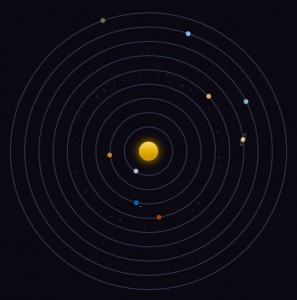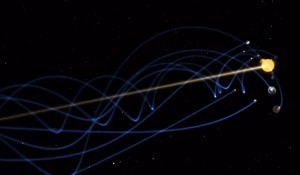My wife and I recently saw the movie Gravity in 3D. It was good, not great, but good. The 3D effects were also good, although I think they have been overhyped. Then again any movie starring Sandra Bullock and George Clooney is likely to be Hollywood overhyped.
By coincidence, I happened across a video on Youtube:
http://www.youtube.com/watch?v=0jHsq36_NTU
The video shows that our old notions of the planets in our solar system lazily rotating around the sun is actually not correct. This is how we’ve been taught to see it: 
The thing is, that’s not how it really looks. This is how it looks:
 In this version, the sun is charging through space like a comet at 70,000 miles per hour, dragging all the planets twirling behind it by the force of gravity. The result is we actually move in a helix-like motion, not unlike a strand of DNA.
In this version, the sun is charging through space like a comet at 70,000 miles per hour, dragging all the planets twirling behind it by the force of gravity. The result is we actually move in a helix-like motion, not unlike a strand of DNA.
I thought this was pretty interesting, but I’m a bit of a space geek. But that’s not what I’m really writing about here. It seems we’ve lost interest in things. Space just happens to be one of them, but I’m trying to use it to make my point.
When I was a kid, outer space was pretty much a mystery to the layman. Aside from the obligatory science lessons in school about the solar system (see first picture above), and the really cheesy science fiction movie, the stars were just something to gaze at from time to time. Oh sure, we learned to identify the North Star and the Big Dipper in Boy Scouts, but they were just connect-the-dots points of light. Then came Sputnik.
In 1957, the Soviets launched the first man-made satellite, Sputnik. For the first time ever there was an object flying over us in space orbit that had been created by man. The game was on. In 1958 President Eisenhower created the National Aeronautics and Space Administration (NASA) The same legislation created the Advance Projects Research Agency (ARPA) which started the notion of the Internet, but that’s another story.
Generally speaking, Americans didn’t cotton to the idea of the “Ruskies” flying a space vehicle over our heads every ninety minutes or so. It could be seen with the naked eye, and after the novelty wore off, people began clamoring that the Soviets were ahead of us in space, and we were still locked on the ground with their little bright light flying over giving us the proverbial finger about sixteen times a day.
Thus began the “space race” between us and the Soviets, and a decade of growing public interest in all things space. We went from satellites to manned missions, reaching a finale when the US became the first country to put a man on the moon in 1969.
It was an interesting and exciting time. We learned about rockets and propulsion, gravity and re-entry vehicles. We learned about the “sling-shot” method to launch a vehicle into space. We, the collective “we” learned a lot. Kids took a new interest in science, parents bought model rockets for their children. We learned new vocabulary words. Most importantly, we discovered a national unity, a purpose. Man could do great things; we could even leave this planet if we chose.
We landed on the moon, six times to be precise. Technology advanced by leaps and bounds. Everything from high-tech plastics to lasers to the first major uses of the computer came about as a result of the space program. We talked about going farther; Mars, colonies in space. There seemed to be no limits.
And then it fizzled. I think it started with a “been there, done that” attitude that began creeping in. Further space exploration began to look too expensive. There were other priorities. Sure, we had the Space Shuttle, unmanned space probes, and we landed robots on Mars, but it wasn’t the same. The public interest drifted away from space, replaced with only a series of space monster movies like Alien which suggested space was an evil place where we did not want to travel. Even current movies like Gravity suggest disaster and chaos in space.
All this brings me to my point: When we lost interest in space, we lost something else. It seems that desire to reach for the stars is gone in our society. We have turned inward, focus on trivia, and stopped dreaming. My freshmen college students can’t even name the planets, much less exhibit any knowledge of space. Things we knew when we were fifteen are Greek to the current generation.
How do we lose things we once knew? How do we drift off course, more interested in self-esteem and self-enjoyment than seeking challenges and reaching for the stars?
I don’t have an answer, but it is troubling. The space program brought us technology advancments beyond imagination, including the Internet, which offers endless possibilities for knowledge and growth. But it seems we’d rather use social media, more interested in Facebook and Twitter than exploring the Internet like the greatest library of all time.
The age of space exploration was a good time, for all of us. We thought outside of our own little worlds. We thought of possibilities. We dreamed dreams. Now it seems those days are over, and we are the worse off for it.

